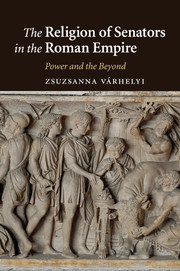2 - Religious groups among senators
Published online by Cambridge University Press: 06 July 2010
Summary
In Chapter 1 I discussed the religious authority that the whole Roman imperial senate, as a body, claimed for itself in the face of the almost unlimited political and military control of the emperor, and how this religious authority contributed to the cultural identity of the imperial senate. We saw this religious claim expressed primarily at senate meetings, in what appear to be highly charged and potentially precarious situations, in which the senate benefited from appearing as a unified group: it was only their corporate power that could stand up to that of the emperor. As I showed, this communal religious power was a key element in the power of the imperial senate as a body. Yet it is also true that the situations in which we can observe how power – and establishing what was to be seen as normal – was negotiated within the whole senate can offer us only limited insights into what motivated senatorial decisions about any debatable matter. Did senators discuss religious matters in smaller senatorial circles, amongst themselves? Did senators form any distinct subgroups, in which they laid claim to their unique authority with regard to the divine? Can we find any level, other than the whole senate, in which they understood themselves to have special access to the divine? In studies of Judaism and early Christianity for the same period, such issues of “group formation” or “community formation” have been the subject of intense study.
- Type
- Chapter
- Information
- The Religion of Senators in the Roman EmpirePower and the Beyond, pp. 56 - 90Publisher: Cambridge University PressPrint publication year: 2010



